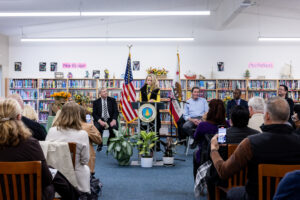 We are always proud of our work with Conscious Kitchen! What a joy to share our organic school food program in person with top leaders across our country for National School Breakfast Week. USDA Secretary of Agriculture Tom Vilsack, California First Partner Jennifer Siebel Newsom, Congressman John Garamendi, and State Superintendent Tony Thurmond joined Conscious Kitchen at Betty Reid Soskin Middle School in the West Contra Costa Unified School District, just as the USDA explores new requirements for school lunches: decreasing sugar intake, limiting sodium requirements, and increasing the amount of whole grains in each meal. Our organic school food program falls in line with these goals and more, when schools prepare fresh, organic scratch-cooked meals made with healthy, nutritious, fresh, local, organic, seasonal, nutritious (FLOSN) ingredients.
We are always proud of our work with Conscious Kitchen! What a joy to share our organic school food program in person with top leaders across our country for National School Breakfast Week. USDA Secretary of Agriculture Tom Vilsack, California First Partner Jennifer Siebel Newsom, Congressman John Garamendi, and State Superintendent Tony Thurmond joined Conscious Kitchen at Betty Reid Soskin Middle School in the West Contra Costa Unified School District, just as the USDA explores new requirements for school lunches: decreasing sugar intake, limiting sodium requirements, and increasing the amount of whole grains in each meal. Our organic school food program falls in line with these goals and more, when schools prepare fresh, organic scratch-cooked meals made with healthy, nutritious, fresh, local, organic, seasonal, nutritious (FLOSN) ingredients.
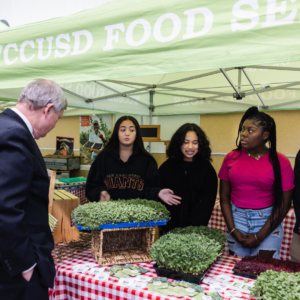 The visit’s celebration of community, farmers, food, and possibility reinforced why we do what we do. The enthusiastic energy of everyone involved provided great inspiration for us all to continue to fight to change systems for the benefit of students, families, communities, farmers, soils and our Earth. Farm-to-school programming, universal school meals, and procurement from local, organic farms are critical in nourishing the minds and bodies of our students. We are especially grateful for the USDA and CDFA’s encouragement and prioritization of supporting small to medium-sized, BIPOC and women-owned farms, as we work to support a food system rooted in justice and resilience. Showcasing the often less-represented and marginalized farmers is integral to the work of Conscious Kitchen and success of all.
The visit’s celebration of community, farmers, food, and possibility reinforced why we do what we do. The enthusiastic energy of everyone involved provided great inspiration for us all to continue to fight to change systems for the benefit of students, families, communities, farmers, soils and our Earth. Farm-to-school programming, universal school meals, and procurement from local, organic farms are critical in nourishing the minds and bodies of our students. We are especially grateful for the USDA and CDFA’s encouragement and prioritization of supporting small to medium-sized, BIPOC and women-owned farms, as we work to support a food system rooted in justice and resilience. Showcasing the often less-represented and marginalized farmers is integral to the work of Conscious Kitchen and success of all.
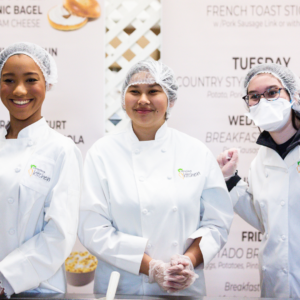 A highlight of the day was the opportunity to elevate students with the opportunity to share directly with leaders of their state and nation. With the knowledge, skills and leadership developed through our Conscious Kitchen Ambassadors program, students were empowered to speak with the dignitaries about the importance of farm fresh food, organics, recipes and “Plated Up” scratch-cooked meals. Our program actively engages next generation food systems leaders in wide-ranging training, hands-on learning, and education in organic food systems. The lessons that these students gain do not end here, as we work towards our goal of having students carry these skills throughout their life and spread the importance of more sustainable food systems across the country.
A highlight of the day was the opportunity to elevate students with the opportunity to share directly with leaders of their state and nation. With the knowledge, skills and leadership developed through our Conscious Kitchen Ambassadors program, students were empowered to speak with the dignitaries about the importance of farm fresh food, organics, recipes and “Plated Up” scratch-cooked meals. Our program actively engages next generation food systems leaders in wide-ranging training, hands-on learning, and education in organic food systems. The lessons that these students gain do not end here, as we work towards our goal of having students carry these skills throughout their life and spread the importance of more sustainable food systems across the country.
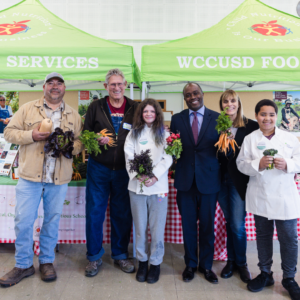 This program would not be possible without the farmers, who we thank for every bite of food! We outfitted the dining hall with a “Soskin Farmer’s Market” featuring local organic harvests. Two Northern California farmers with whom we work closely (and are also now registered in the USDA Fresh Fruits and Vegetable Pilot Program!), Al Courchesne of Frog Hollow Farm and Javier Zamora of JSM Organics, were on site for this wonderful opportunity. The school’s production farm manager, Matthew Linzer, and students who help operate the farm sampled beautiful, nutrient-packed greens grown on-site, speaking about how that food is integrated into district recipes.
This program would not be possible without the farmers, who we thank for every bite of food! We outfitted the dining hall with a “Soskin Farmer’s Market” featuring local organic harvests. Two Northern California farmers with whom we work closely (and are also now registered in the USDA Fresh Fruits and Vegetable Pilot Program!), Al Courchesne of Frog Hollow Farm and Javier Zamora of JSM Organics, were on site for this wonderful opportunity. The school’s production farm manager, Matthew Linzer, and students who help operate the farm sampled beautiful, nutrient-packed greens grown on-site, speaking about how that food is integrated into district recipes.
Providing organic, farm-fresh food is crucial for students and their education. As Secretary Vilsack explains, “This state understands that when youngsters are fed and fed well, the expectation is that they’ll do well.” Conscious Kitchen’s work in providing organic, well-sourced meals ensures that students have the energy to focus in class, and it is thanks to our partnerships with farmers and districts like WCCUSD that we can make this happen.
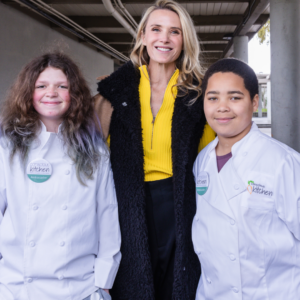 Collaboration, innovation and intention can change the world — and for us, school meals offer such a clear possibility for direct and intersectional positive impact for millions of students, farmers, providers and communities in California and across our nation. We’re deeply committed to systems change and invigorated by the growing support from local, state and federal leaders who understand the importance of the farm-to-school movement. We are proving that serving fresh, local, organic, seasonal, nutritious school food to students is possible. We hope the Conscious Kitchen model inspires many more to get involved with their local farms, youth and communities and grow a deeper understanding of how organic, sustainable farming can help change the world. Join us!
Collaboration, innovation and intention can change the world — and for us, school meals offer such a clear possibility for direct and intersectional positive impact for millions of students, farmers, providers and communities in California and across our nation. We’re deeply committed to systems change and invigorated by the growing support from local, state and federal leaders who understand the importance of the farm-to-school movement. We are proving that serving fresh, local, organic, seasonal, nutritious school food to students is possible. We hope the Conscious Kitchen model inspires many more to get involved with their local farms, youth and communities and grow a deeper understanding of how organic, sustainable farming can help change the world. Join us!